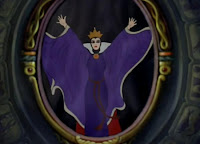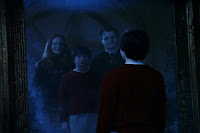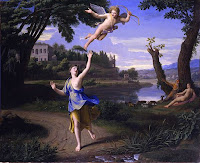I recently started watching the tv show Once Upon a Time, and I've been looking at the ancient roots of some of its fairy-tale themes. Magic mirror have always been part of the show, since the evil queen from Snow White is arguably the main character:
 |
| image credit |
But in a recent episode there was a magic mirror in which absent loved ones appear, shades of Harry Potter's Mirror of Erised:
 |
| image credit |
Assuming that ancient mirrors were crummy, I wondered if they would seem magical before they provided an accurate reflection. But, first misconception: ancient mirrors were capable of an accurate reflection. Obsidian mirrors recovered from Turkey work well, as this image shows:
 |
| image credit |
Ancient Greek mirrors were made of copper, iron or silver; glass mirrors are first found in ancient Rome. It seems that even if ancient mirrors did not allow you to count all your nose hairs, they seemed mystical enough for a few legends to grow up around them.
The Encyclopedia of Magic and Alchemy says that the witches of Thessaly wrote oracles on mirrors, and that Pythagoras foretold the future using a magic mirror. Ancient healers suspended a mirror in water to determine whether a sick person could be healed. These folkloric uses of mirrors are echoed in literature, as with the mirror analogy in Republic 10. The mirror on the moon found in Lucian, in which you could see your family on earth, demonstrates how magical mirrors could seem. However, as Fairytale in the Ancient World explains, the oracular role in Snow White was filled by more typical oracle figures, such as the moon or sun.
Pin It
